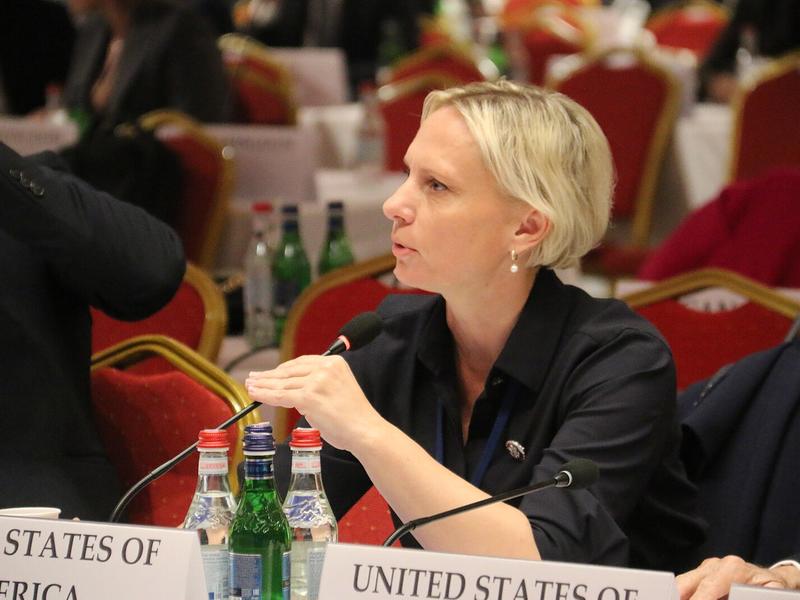
Democrats' chances of retaking the House in 2018 depend on the success or failure of candidates like Elissa Slotkin. At 41, she has compiled the kind of impressive national security resume her party craves: she served three tours in Iraq as an Arabic-proficient CIA analyst, then rose to Acting Assistant Secretary of Defense under the Obama administration, handling sensitive matters ranging from ISIS to Russia and Iran.
But the third-generation Michigander sports one obvious liability in her bid to unseat GOP Rep. Mike Bishop (MI-08): despite growing up in a well-known meatpacking family on a farm in rural Holly, she hasn't been registered to vote in Michigan until she moved back full-time in February.
All over the map, Democrats are counting on political outsiders - veterans, national security experts, and startup executives - to capitalize on discontent with "DC politics as usual" and President Trump. But in many cases, these candidates' educations and professional successes have taken them far away from the humble hometowns they are now seeking to reconnect with, giving Republicans an opening to portray them as out-of-touch elites.
In the polarized Trump era, elite pedigrees are a more acute challenge for Democrats than ever - and Slotkin, a Cornell graduate, isn't alone. In California's rural 10th CD, Democrat Josh Harder stresses his Central Valley upbringing, but downplays his senior role at a San Francisco venture capital firm. And Democrat/Rhodes Scholar Andy Kim grew up in New Jersey's 3rd CD, but didn't live there when he was an ISIS adviser in the Obama White House.
A Cook Political Report review of competitive House elections in 2014 and 2016 found that just two of 17 non-incumbent Democrats with Ivy League degrees won their races (12 percent), compared to 16 of 67 non-Ivy League graduates (24 percent). The two Ivy League winners: Rep. Seth Moulton (MA-06), better known for his service in the Marines, and Rep. Josh Gottheimer (NJ-05), who ran against a deeply flawed GOP incumbent.
In a Monday interview with the Cook Political Report, Slotkin was down-to-earth, blunt - even occasionally salty - about her own party's challenges and realistic about the lines of attack her opponents will use against her. She plans to contrast her service in Iraq with Bishop's lengthy political career. And in her rollout video, she emotionally discusses returning to Michigan often to care for her late mother after she was diagnosed with cancer.
Michigan's 8th CD, which President Trump won by seven points, is exactly the kind of "reach" district Democrats need to win the majority. But Slotkin's success hinges on whether voters will see her as "one of them."
The largest city in Michigan's 8th CD is Lansing, home to plenty of liberal-leaning state government workers and Michigan State University in East Lansing. But most of the 8th CD's voters live in the outer Detroit suburbs of Livingston and Oakland counties, which lean Republican. It sports the second-highest percentage of college graduates in Michigan, but by no means is it exclusively upscale.
Slotkin brings a fascinating family background to the race. Her great-grandfather, meatpacker Sam Slotkin, founded Hygrade Foods and her grandfather, Hugo Slotkin, invented the original Ball Park franks sold at Tigers Stadium. Bypassing the meat business, Elissa Slotkin earned a degree in rural sociology at Cornell, learned Swahili and Arabic, worked in Kenya and Israel and attended grad school at Columbia before being recruited by the CIA after 9/11.
Michigan's 8th CD has embraced candidates with security profiles before: between 2000 and 2014, it elected Republican Mike Rogers, a former FBI special agent who had fought organized crime in Chicago. But Rogers had been elected to the state senate twice before getting elected to Congress. Slotkin starts out with a lot of enthusiasm from donors and Democratic strategists in DC but is building a Michigan political base from scratch.
In fact, there is no guarantee that Slotkin will clear the Democratic primary field. Michigan's primary isn't until next August and it's still possible that a Lansing-based liberal activist candidate with stronger ties to Michigan State could emerge. Slotkin doesn't come across as a dove on foreign policy and is hesitant to criticize free trade deals. That could put her at odds with voters who vaulted Bernie Sanders to a surprise primary win last year.
If Slotkin does make it to the general, Democrats are optimistic Bishop's lengthy record - dating back to his Lansing years as majority leader of the state senate - hasn't yet been fully litigated. Even a few Republicans acknowledge Bishop cuts an insider figure and can come across as confrontational. But Democrats' 2016 recruit, former child actor Melissa Gilbert, dropped out late in the game and her successor on the ballot never got much traction.
In 2018, we may find out whether Michigan voters are more in the mood for Slotkin's resume or that of musician Kid Rock, whose house is eight miles from Slotkin's family farm. But recent wave elections have told us that when voters are angry with the incumbent president or the status quo, they are much more willing to overlook challengers' flaws and weak district ties. That's why the race in Michigan's 8th CD could be such an interesting bellwether.









Subscribe Today
Our subscribers have first access to individual race pages for each House, Senate and Governors race, which will include race ratings (each race is rated on a seven-point scale) and a narrative analysis pertaining to that race.